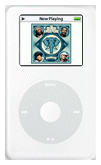 According to Victor Aziz of Cardiff's Whitchurch Hospital (psychiatrist), the increasing exposure of music to human beings through new technology may lead to more people suffering from "musical hallucinations". He explained that a music hallucination wouldn't just simply be like having a song stuck in your head; it would be the musical equivalent of a visual hallucination. It’s like having a song playing in your head that you can’t stop.
According to Victor Aziz of Cardiff's Whitchurch Hospital (psychiatrist), the increasing exposure of music to human beings through new technology may lead to more people suffering from "musical hallucinations". He explained that a music hallucination wouldn't just simply be like having a song stuck in your head; it would be the musical equivalent of a visual hallucination. It’s like having a song playing in your head that you can’t stop.
His warning is interesting and shouldn't be ignored. It also makes sense when you consider that people probably are listening to far more music when they buy a portable MP3 player. The problem in the past with portable cassette players like Sony's walkman was the limited battery life and you could store a lot less songs on a tape than a HDD-based MP3 player (generally). A Discman is also awkwardly shaped and not something you could usually keep in a pocket. But an iPod or some other MP3 player is ideal to carry with you all the time, so generally people will listen to more music. So going by averages, musical hallucinations will probably rise.
If you have found yourself suffering from a musical hallucination, you will be surprised to find that the fix for the problem lies with the song you are hearing. Simply play the song with any player and it will compete with the song playing in your head and ultimately suppress it.
Source:
The Register














